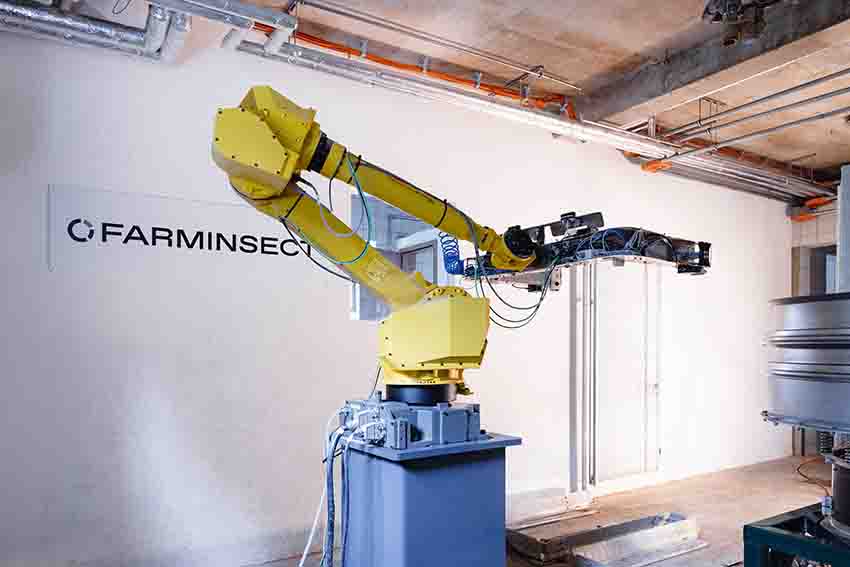FarmInsect focuses on the production of Black Soldier Fly (Hermetia illucens) larvae, reforming the way they think about sustainable sources of protein. FarmInsect founders, Thomas Kuehn and Wolfgang Westermeier, have developed a modular semiautomated system for decentralized larvae fattening, introducing an innovative fusion of biology and technology to conventional agriculture.
FarmInsect’s vision is to replace unsustainable protein components like soy and fish meal in animal feed with an advanced, eco-friendly alternative. With their insect larvae rearing system Kuehn and Westermeier aim at a more circular use of natural resources: they use sidestreams from crop farming and food industries as feedstock for the insects and the produced larvae as a well-recognized and healthy protein source for livestock and pet animals. The circular approach allows on-site production of high-quality, protein-rich feed, with lower CO2 emissions, and independent of international supply chains.
On top of that the company has another USP in stock: Until now FarmInsect is the exclusive insect farming system provider in Europe offering plant operators fixed purchase contracts for their produce – thus ensuring a secure and sustainable income for future insect farmers.
Core Business Areas
FarmInsect’s business operates on two main pillars: Large-scale Black Soldier Fly (BSF) reproduction and the distribution of a turnkey solution for decentralized cultivation of Black Soldier Fly Larvae (BSFL) by means of a partially automated rearing system.

At their Bavarian head venue FarmInsect established a standardized method for producing great capacities of BSF seed larvae. These five-day-old larvae are regularly delivered to customers who individually run operational units of a growing insect-rearing network. At their farms operators introduce the precious hatchlings to the technological centerpiece of the FarmInsect plant system: patented climate chambers designed for optimal BSFL growth. In true inhouse and vertical farming manner these unique climate chambers accommodate great numbers of larvae rearing boxes stacked in multiple layers.
FarmInsect’s exclusive partnership with Better Insect Solutions (BIS) – initially an internal project of Big Dutchman group sister companies SKOV, Big Dutchman and INNO+ focusing on centralized industrial-scale insect farming – has led to a high-tech system for small- to medium-sized BSFL fattening units.
These highly advanced end-to-end systems comprise housing units, feeding and climate knowhow as well as heat recovery mechanisms backed by years of technological functionality tested in pig and poultry production. Production volumes per setup range between 300 to 1,500 tons of live larvae, reliant on the conditions and capacities at individual farm grounds.
Recent Developments
In October 2023, FarmInsect secured an impressive €8 million in funding to further enhance the company’s operations through research and development. Investors include Sandwater, an Oslo-based climate-tech venture capital firm, Bayern Kapital’s Growth fund, Minderoo Foundation’s Strategic Impact Fund, and the European Innovation Council Fund, all of whom recognized the great potential of the company’s innovative approach.

Ongoing R&D efforts include adapting BSFL breeding lines for optimized use of regional side streams and enhancing feed conversion ratios (FCR). Further focus is laid on the improvement of reproduction parameters for adult flies, such as mating and egg production rates.
Product & Service Range
At the heart of the company’s offering stands the modularized insect fattening system, designed for decentralized on-site BSFL production. FarmInsect customers receive cutting-edge hardware, along with a subscription-based delivery of seed larvae for a seamlessly operating process. Moreover, FarmInsect’s proprietary software platform offers constant support to operators via permanent monitoring of the BSFL production cycle on site.
In 2023, the start-up signed a contract with a processing partner and introduced “EcoCircle” – a buy-back platform for regionally produced larvae. This advancement greatly eases plant operator’s efforts by eliminating the need to independently market their larvae produce to feed manufacturers. The partnering company collects cooled down larvae from FarmInsect’s operating network and subsequently engages advanced technology to process the harvest into high-quality insect products – protein meal and oil.
State of the insect-market
The European insect farming sector has witnessed an immense evolution in the past decade. While in the beginning centralized industrial insect farming was the norm, FarmInsect introduced an unseen innovation by promoting decentralized insect farming units.
The decentralized, more regional insect farming approach unlocks potential of vacant farm buildings with the appropriate structural parameters. With over 40,000 farmers in the EU possibly discovering insect rearing as a promising future alternative, prospects for a vast network of decentralized larvae fattening setups are clearly enormous.

Insect-market Trends
In a time where sustainable, environmentally friendly solutions are urgently needed, the overall demand for insect-based feed components is gaining traction. There are more than 20 million pet cats and dogs in German households alone and customers are increasingly focused on reducing not only their own but also their pets’ carbon footprint.
Insect-based pet food not only aligns with these eco-conscious values but may also offer a hypoallergenic alternative for pets with allergies to traditional protein sources. Additionally, BSFL contain a selection of valuable ingredients, including a high percentage of lauric acid and antimicrobial peptides, making it a wellspring of benefits for pet’s health. As awareness grows, here lays an even greater potential for further marketing opportunities.
The market for larval protein is set to exceed the demand for feed, with the broader food industry eager to embrace this sustainable innovation. Producers’ markets are already emerging, and the overall market for insect protein is projected to increase fifty-fold by 2030.

